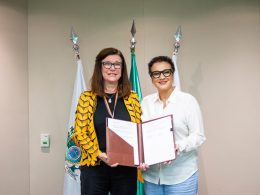The Asian Infrastructure Investment Bank (AIIB) has approved a USD 1 billion Climate-Focused Policy-Based Financing (CPBF) loan to support Brazil’s efforts to meet its Nationally Determined Contributions (NDCs) and advance its Ecological Transformation Plan. The financing will help implement policies across sustainable finance, energy transition, and green and resilient infrastructure.
AIIB President and Chair Jin Liqun said Brazil’s reform programme “couples policy ambition with practical market reforms,” adding that the Bank’s support “will help channel more private capital into sustainable finance, accelerate the energy transition, and build climate-resilient infrastructure—delivering tangible benefits for people, nature and the economy.”
Tatiana Rosito, Vice Minister for International Affairs at Brazil’s Ministry of Finance and AIIB Alternate Governor, said the partnership demonstrates that “climate action and development go hand in hand.” She added, “This partnership is helping us turn policy into progress – creating markets for sustainable finance, advancing carbon market and blended-finance mechanisms such as Eco Invest Brasil, driving the energy transition, and recognizing nature as essential infrastructure for a resilient future.”
The programme focuses on three pillars—sustainable finance, energy transition, and green and resilient infrastructure—to mobilise capital for low-carbon growth, promote sustainable bioenergy, and enhance the resilience of natural assets. Key outcomes include establishing a governance framework for Brazil’s national carbon market, mobilising private capital for sustainable infrastructure and forest conservation, developing low-emission aviation fuel, strengthening early-warning systems for extreme heat, and advancing forest and mangrove restoration.
The initiative will complement policy loans from the World Bank and Inter-American Development Bank (IDB), with semi-annual reviews to monitor implementation and progress.
This financing builds on AIIB’s recent analytical work, including the Nature as Infrastructure Report (2023), which redefines ecosystems as essential infrastructure assets, and the Infrastructure for Planetary Health Report (2025), linking infrastructure investment with environmental and climate resilience outcomes.

















